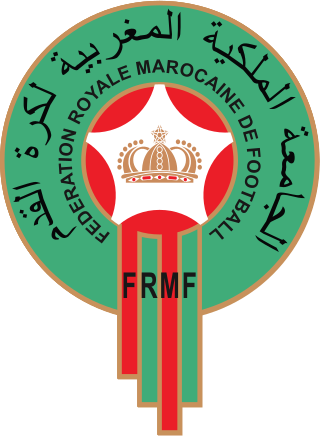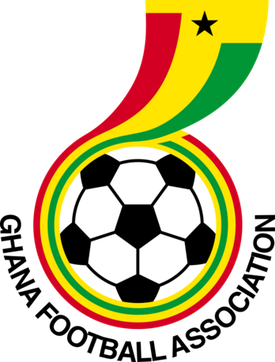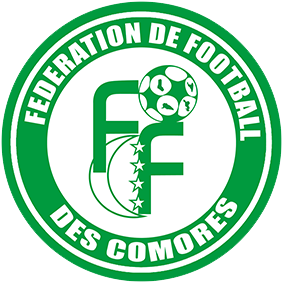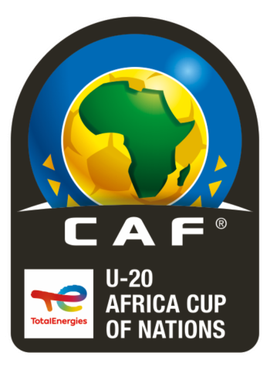Related Research Articles

The Confederation of African Football (CAF) (in French Confédération Africaine de Football) is the administrative and controlling body for association football, beach soccer, and futsal in Africa. It was established on 8 February 1957 at the Grand Hotel in Khartoum, Sudan by the national football associations of: Algeria, Egypt, Ethiopia, Nigeria, and South Africa. following formal discussions between the aforementioned associations at the FIFA Congress held on 7 June 1956 at Avenida Hotel in Lisbon, Portugal.

The Cameroon national football team, also known as the Indomitable Lions, represents Cameroon in men's international football. It is controlled by the Fédération Camerounaise de Football, a member of FIFA and its African confederation CAF.

The Morocco national football team represents Morocco in men's international football, and is controlled by the Royal Moroccan Football Federation, the governing body for football in Morocco.

The Ghana national football team represents Ghana in men's international football. The team is named the Black Stars after the Black Star of Africa in the flag of Ghana. It is governed by the Ghana Football Association, the governing body for football in Ghana. Prior to 1957, it played as the Gold Coast.

The Ivory Coast national football team represents Ivory Coast in men's international football. Nicknamed the Elephants, the team is managed by the Ivorian Football Federation (FIF). The team has won the Africa Cup of Nations three times, in 1992, 2015 and 2024, and has qualified for the FIFA World Cup three times, in 2006, 2010, and 2014.
The Mali national football team represents Mali in men's international football and is governed by the Malian Football Federation. The team's nickname is Les Aigles. They represent the country at tournaments organized by both FIFA and the Confederation of African Football (CAF).

The Ethiopia national football team, nicknamed Walia, after the Walia ibex, represents Ethiopia in men's international football and is controlled by the Ethiopian Football Federation, the governing body for football in Ethiopia. The team has been representing Ethiopia in regional, continental, and international competitions since its founding in 1943. The Walias play their home games at Addis Ababa Stadium located in the capital city of Addis Ababa. They are currently ranked 150th in the world according to the FIFA World Rankings and 44th in CAF.
The Gabon national football team represents Gabon in men's international football. The team's nickname is The Panthers and it is governed by the Gabonese Football Federation. They have never qualified for the FIFA World Cup, but have qualified eight times for the Africa Cup of Nations. Gabon is a member of both FIFA and Confederation of African Football (CAF).

The Madagascar national football team, nicknamed Barea after the island's zebu, is the national team of Madagascar and is controlled by the Malagasy Football Federation. It has never qualified for the finals of the World Cup. It took part in its first Africa Cup of Nations in 2019. Among its biggest wins was a 1–0 home victory over Egypt in the qualification rounds of the 2004 Africa Cup of Nations until being surpassed by a recent 2–0 win over Nigeria in the group stage of the 2019 Africa Cup of Nations. Reflecting the official name of the country at the time, the team was known as the Malagasy Republic national football team between 1958 and 1975.

The Chad national football team, nicknamed Les Sao, represents Chad in international football and is controlled by the Chadian Football Federation, the governing body for football in the country. The team has never qualified for the World Cup finals or Africa Cup of Nations. Home matches are played at the Idriss Mahamat Ouya Stadium. In April 2021, FIFA banned the Chad national football team from participating in global football over the Chadian government's interference with the Chadian Football Federation.

The Central African Republic national football team, nicknamed Les Fauves, is the national team of the Central African Republic and is controlled by the Central African Football Federation. They are a member of CAF. Despite being traditionally one of the weakest teams in Africa and the world, they recently achieved success. They won the 2009 CEMAC Cup by beating Gabon in the semi-finals and Equatorial Guinea in the final 3–0. Their FIFA ranking rose from 202nd in August 2010 to 89th by July 2011. On 10 October 2010, they earned a shock 2012 Africa Cup of Nations qualifier win at home against Algeria 2–0, which put them top of their qualification group. The team won its first FIFA World Cup qualifier on 2 June 2012 after beating Botswana 2–0 at home.

The Zanzibar national football team represents Zanzibar in international football and is controlled by the Zanzibar Football Federation.

The Comoros national football team represents the Comoros in international football and is controlled by the Comoros Football Federation. It was formed in 1979, joined the Confederation of African Football (CAF) in 2003, and became a FIFA member in 2005. Comoros qualified for their first major tournament in 2021, after their 0–0 draw with Togo assured them of a place in the 2021 Africa Cup of Nations.

The U-20 Africa Cup of Nations, known for short as the U-20 AFCON and for sponsorship purposes as TotalEnergies U-20 Africa Cup of Nations, previously known as the African Youth Championship and the African U-20 Championship, is the biennial international youth football tournament organized by the Confederation of African Football (CAF) for its nations consisting of players under the age of 20. It serves as the African qualification tournament for the FIFA U-20 World Cup.

The Burundi women's national football team, nicknamed the Swallows, represents Burundi in women's international football competitions. The team has competed since 2016 in matches recognised by FIFA, the sport's international governing body. A senior national team has been continually inactive, but an under-20 team has played in numerous matches. Further development of football in the country faces challenges found across Africa, including inequality and limited access to education for women. A women's football programme did not exist in Burundi until 2000, and only 455 players had registered for participation on the national level by 2006.

The Rwanda women's national football team represents Rwanda in women's association football and is controlled by the Rwandese Association Football Federation. It had to date been scheduled to compete in one major tournament, the inaugural Women's Challenge Cup held in Zanzibar in October 2007, but the event was ultimately canceled. It has finally debuted in February 2014 against Kenya. The team is nicknamed The She-Amavubi.

The 2017 Africa U-20 Cup of Nations, officially known as the Total U-20 Africa Cup Of Nations, Zambia 2017, was the 14th edition of the Africa U-20 Cup of Nations, the biennial international youth football tournament organized by the Confederation of African Football (CAF) for players aged 20 and below. The tournament was set to take place in Zambia between 26 February – 12 March 2017.
Jean Thierry Lazare Amani is an Ivorian professional footballer who plays for Belgian Pro League club Union Saint-Gilloise, and the Ivory Coast national team as a central midfielder.
Jordi Baininwa Liongola is a professional footballer who plays as a midfielder for Belgian National Division 1 club RAAL La Louvière. Born in Belgium, he plays for the Burundi national team.
References
- ↑ "CAF U20 Cup of Nations: Black Satellites duo Danlad Ibrahim and Issahaku listed in tournament's Best XI". GhanaWeb. 7 March 2021. Retrieved 2 September 2021.
- ↑ Strack-Zimmermann, Benjamin. "Burundi vs. Central African Republic (2:2)". www.national-football-teams.com.